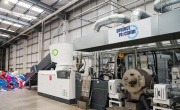SSAIN halts legal action versus Sinfin incinerator

Anti-incineration group SinFin, Spondon, and All Against Incineration(SSAIN) has announced that it will no longer be taking legal action against the Resource Recovery Solutions (RSS)incinerator in Sinfin, Derby.
According to a letter released today (11 November) by Simon Bacon, Chairman of SSAIN ‘there is no way forward in this specific legal case' thus ending a ‘sustained [legal] campaign’.
This follows a protracted legal affair between SSAIN(and Derby Friends of the Earth) and RRS and Derby Council over the legal grounds in which the council granted the company planning permission.
Last month, the Royal Courts of Justice in London dismissed an appeal to overturn the decision. It was after this latest hearing that SSAIN and Derby Friends of the Earth were advised by legal counsel that there is ‘no way forward’ with the case.
In a statement released today, Simon Bacon, Chairman of SSAIN insisted that although the legal case may be over, ‘those fighting this proposal will continue to place pressure on the councils to pull the plug on this unwelcome incineration plant and will explore any avenues open to them to continue their fight against the plant.’
Incinerator case details
First proposed in 2009 by RRS (a wholly-owned subsidiary of waste management company, Shanks Group plc), the £130-million incinerator at Sinfin Lane would have the capacity to process up to 190,000 tonnes of waste a year and reportedly divert up to 96.5 per cent of residents’ residual waste from landfill.
The plant would utilise mechanical biological treatment (MBT) to extract recyclable materials from residual waste before the remaining content goes through an incineration process to produce solid recovered fuel (SRF) to power an on-site gasification facility. This facility was expected to generate enough electricity to power 14,000 homes.
Derby City Council originally turned down RRS’s application for the plant as it had ruled that the plant would interfere with recycling levels, but the decision was later overturned by High Court, after the company took the council into legal proceedings.
A second planning inquiry, triggered by the court proceedings, was granted by Planning Inspector Alan Robinson in September 2012, which saw RRS finalise the 27 year contract with Derby City Council and Derbyshire County Council, worth an estimated £400 million.
In March 2013, Dorothy Skrytek from Derby Friends of the Earth, supported by SSAIN and members of the Derby community, launched a legal challenge to the judgement of Alan Robinson – specifically regarding where he proposed the plant sat in the waste hierarchy.
The opponents of the incinerator argued that ‘the proposed plant would be so inefficient in its standard electricity only mode that it would fail the R1 test of efficiency which condemns such incineration plants to be classed as disposal plants – which sit on the same tier of the waste hierarchy as landfill in the position of disposal’.
They added that the contractor had ‘never shown any evidence throughout the planning process that they [had] any customer for the 8.1 megawatts of heat energy required to make the Sinfin incineration plant a recovery facility in the waste hierarchy’.
Contract ‘incentivises’ incineration over recycling
The groups also questioned the council’s recent decision to replace a free garden and food waste collection service with a £40 charged service, which they argue will see increases in garden waste placed in residual waste collections – thus feeding the incinerator with the appropriate amount of feedstock.
Bacon also argued that Derby City Council’s recent proposals to end recycling collections in four areas of the city was also part of a move to ‘procure as much waste as possible to justify their proposal of forcing an incinerator on the community of Derby’.
He added that instead of boosting the environmental performance of the area, the Sinfin plant will see “hundreds of thousands of tonnes of waste burnt in the heart of Derby for over 25 years, spewing 172,000 tonnes of carbon dioxide (Co2) into the environment yearly as part of yearly emissions into the community of a billion cubic metres made up of dioxins, furans, acid gases and heavy metals”.
Speaking after the appeal last month, a Shanks spokesperson refuted the claims, saying: “Shanks is and has always been confident that this facility will have significant benefits for the community in Derby, so we welcome this judgement.”
UK incinerator overcapacity
The amount of incinerators in the UK has come under scrutiny recently, with a recent report from Eunomia Research & Consulting suggesting that the UK could see overcapacity in residual waste treatment plants by 2015, if the current rate of construction is not curbed. The report suggests that due to increased emphasis on recycling, reusing and recovering material, residual waste rates are falling, leaving incinerators without the required levels of waste needed to produce efficient and cost-effective processes.
Further to this, the Department for Environment, Food and Rural Affairs (Defra) withdrew £217.1 million of funding for three incinerator PFI (private finance initiative) projects in February, after finding that the 29 energy-from-waste projects that already have funding are ‘sufficient’ to meet the EU’s 2020 landfill diversion targets.
Read more about this case and residual waste treatment overcapacity.





